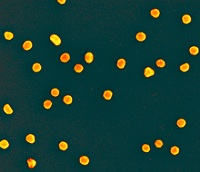 |
| Gold nanoparticles--courtesy of NIST |
If Northwestern Medicine's mouse studies come good, then in the future, doctors could treat lymphoma without toxic drugs with something as simple as minute particles of gold. These block the entry of HDL cholesterol and starve the cancer cells to death, according to new research in PNAS.
Lymphoma cells have a "hunger" for the lipoprotein HDL-cholesterol. They have more HDL receptors on their surface than normal cells, and are dependent on HDL-C for their growth. The synthetic nanoparticles have a spongy surface and a gold core and mimic HDL-C. They are taken up by the lymphoma cell, where they absorb the existing cholesterol and block the entry of more cholesterol. This cuts off the cell's nutrient source.
In the lab, the gold nanoparticles killed cultured B-cell lymphoma cells, and slowed the growth of B-cell lymphoma tumors in mice, without affecting healthy cells. The particles have also been tested in lymphoma as a delivery system for cancer chemotherapies, but early studies showed that they were effective without the cytotoxic payload.
The particle was originally developed as a potential treatment for heart disease, as C Shad Thaxton explains: "At first I was heavily focused on developing nanoparticles that could remove cholesterol from cells, especially those involved in heart disease. The lymphoma work has broadened this focus to how the HDL nanoparticles impact both the removal and uptake of cholesterol by cells. We discovered the particles are multi-taskers."
- read the press release